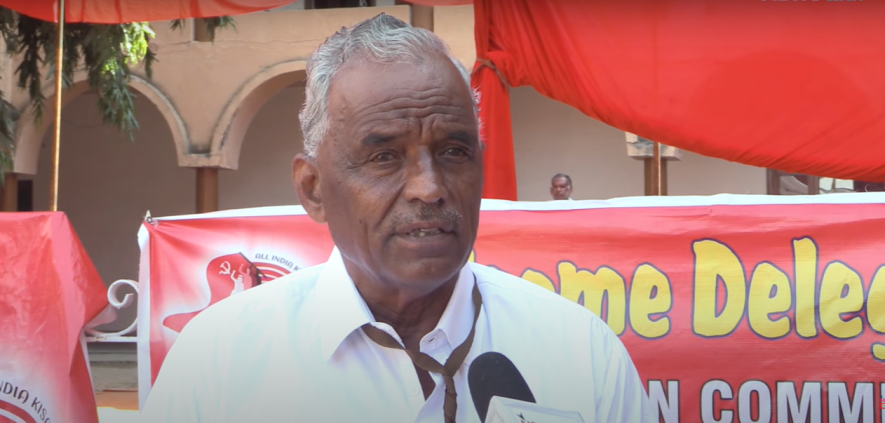Farmer’s Movement: Govts Will be More Cautious in Making Policies: Amra Ram

On June 4, 2024, the results of the Indian General Elections were announced, revealing a humbling outcome for both the ruling National Democratic Alliance (NDA) led by the Bharatiya Janata Party (BJP) and the opposition Indian National Developmental Inclusive Alliance (INDIA) led by the Indian National Congress (INC). The BJP, which boasted it would win over 400 seats, was reduced to 240 from its previous 303 seats in 2019. Meanwhile, the INC nearly doubled its seat count from 52 in 2019 to 99 in 2024.
In an earlier article, this writer had argued that despite a religiously charged atmosphere created by the grand inauguration of the Ram Temple at Ayodhya, the farmers’ movement had dented Prime Minister Narendra Modi’s image of invincibility. The movement shifted focus to issues like joblessness, inflation, hunger, and farmers’ suicides. Badal Saroj, a senior leader from the movement, highlighted its role in consolidating political opposition in several states, including Bihar, Uttar Pradesh, Rajasthan, Madhya Pradesh, and Chhattisgarh.
The election results corroborate this analysis, with BJP losing significant electoral ground in states like Punjab, Haryana, Rajasthan, and Uttar Pradesh. Notably, it lost Ayodhya/Faizabad, the Ram Temple site, to the Samajwadi Party.
Following the election results, this writer interviewed Amra Ram, senior leader from the Communist Party of India (Marxist) who has been elected from the Sikar constituency in Rajasthan. He has also been a senior leader of the All-India Kisan Sabha (AIKS), the peasant wing of the Communist Party of India (Marxist).
Shinzani Jain: Please tell us about your life and political journey in Rajasthan.
Amra Ram: As a student at the Sri Kalyan Government College in Sikar, I actively participated in student organisations, mobilising on various student issues. The Sri Kalyan Government College was the largest university in Rajasthan, and I had the honour of serving as the president of the students’ union there. Following my college years, I was elected twice as the Sarpanch (head) of the gram panchayat (village council) in Mundwara, Rajasthan.
My political journey continued, as I served as a Member of the Legislative Assembly (MLA) four times. I was elected from the Dhod constituency of the Rajasthan Assembly in 1993, 1998, and 2003. In 2008, I was elected as an MLA for the fourth time from the Danta Ramgarh constituency of the Rajasthan Assembly.
Throughout my tenure as an MLA, I consistently raised issues affecting farmers, students, farm labourers, workers, and the common people of Rajasthan in the Assembly. When the government ignored our demands, we took our grievances to the streets through people’s movements. Whether it was the issue of electricity bills, the agitation demanding water supply for irrigation during 2004-05, where eight farmers were martyred, or the farmers’ agitation during 2017-18 that led to the government implementing a waiver of farmers’ loans, we fought both in the Assembly and on the streets.
I was also involved in the farmers’ movement during 2020-21 against the three farm laws. Farmers struggled for more than a year, and eventually, the government led by Prime Minister Modi was forced to withdraw the three farm laws.
On December 9, 2021, the government assured us that they would enact a law to make Minimum Support Price (MSP) a legal guarantee. However, this promise remains unfulfilled to this day. The 2020-21 farmers’ movement was historic, with significant political impact in Rajasthan, Haryana, Uttar Pradesh, and Punjab, where there was massive participation and support for the movement.
In the 2014 and 2019 Lok Sabha elections in Rajasthan, the NDA coalition led by BJP won all 25 seats. However, this time the opposition has won 11 seats, including the Sikar constituency from where I was elected.
In Haryana, the Opposition won five out of 10 seats, and in Uttar Pradesh, the SP, part of the INDIA bloc, won 37 seats. This has been a massive setback for BJP, which had claimed they would win over 400 seats but ended up with around 240. The historic farmers’ struggle significantly influenced the outcome of this election.
SJ: Could you give us a background of the farmers’ movement during 2020-21? How did the movement come to be so massive and historic?
AR: There have been numerous instances across the country where farmers faced government backlash for protesting. However, the farmers' movement gained significant momentum after the tragic events in the Mandsaur district of Madhya Pradesh in 2018. During this agitation, farmers were protesting against the extremely low prices offered for their garlic crops. Despite the cost of cultivation being Rs.100 per kg and the labour employed being substantial, the market price dropped to as low as Rs. 5 per kg. When farmers demanded fair and remunerative prices, the BJP government led by Chief Minister Shivraj Singh Chouhan (now Union Agriculture Minister) responded with force, leading to the death of six farmers.
This brutal response galvanised farmers from different ideological backgrounds across the country. They were mobilised by AIKS to unite in their struggle. A combined movement was formed around issues, such as non-remunerative prices, land acquisition, and opposition to the three farm laws passed by the BJP-led NDA government.
Despite attempts by the Indian government to discredit and subdue the movement—labelling the protesting farmers as ‘Naxalites’, ‘Maoists,’ ‘hired goons,’ and even suggesting foreign support from China and Pakistan—the farmers remained steadfast. They followed the directives of the Samyukta Kisan Morcha (a farmers’ collective) and continued their protest nationwide.
The AIKS played a crucial role in organising farmers on a national scale. Ultimately, the farmers' perseverance led to a significant victory when the government was forced to withdraw the contentious farm laws. However, the government has yet to fulfil the written guarantee given in December 2021 to enact a law making MSP a legal guarantee.
When the NDA government came to power in 2014, they made several promises, including providing MSP to farmers, creating two crore jobs for the youth, and bringing back black money from foreign accounts to deposit in Indians' bank accounts. Instead of fulfilling these promises, the government did the opposite. The results of recent elections reflect the response of the youth, farmers, and armed forces to the government's actions. For instance, the Agniveer scheme 9on Army recruitment), which was perceived as detrimental to both the armed forces and national security, was also a point of contention.
Through these elections, the people have expressed their dissatisfaction with the government's unfulfilled promises and policies, leading to a significant setback for the ruling party.
SJ: Could you explain how this movement became so big? How did the farmers mobilise?
AR: The farmers' movement persisted for over a year, with significant contributions from the Sikh community and their Gurudwaras, which sustained the movement through their langars (community kitchens). Both men and women from the Sikh community, particularly those aged between 50 and 75 years, tirelessly provided food throughout the year. The support from the Sikh diaspora also played a crucial role in maintaining the momentum of the protest.
The entire farming community, along with their families, was deeply involved. Farmers from nearly every village in Punjab and Haryana participated, with some joining for a few months and others staying for the entire duration. The historic participation of women was particularly noteworthy. The movement's impact was such that the Chief Minister and Deputy Chief Minister of Haryana were effectively barred from entering any village for the entire year.
The significant support and solidarity from the people of Uttar Pradesh, Haryana, Punjab, and Rajasthan were reflected in the outcomes of the elections in these regions. This en masse support underscored the widespread backing for the farmers' demands and their collective strength in opposing the government's policies.
SJ: How did the farmers’ movement connect with and appeal to the people from other sectors and the urban population?
AR: The farm laws introduced by the government were seen as a severe threat not only to the agrarian sector but also to the broader population of India. The intent behind these laws was perceived as facilitating the accumulation of agricultural produce by large corporations, such as Adani and Ambani, which would disadvantage farmers and the general populace alike. The movement against these laws was thus also a struggle against the monopolistic practices of big corporations and the toll mafia controlled by corporate giants, such as Reliance. During the year-long protests, toll fees were waived, benefiting common citizens and saving them thousands of crores of rupees.
Even without the farm laws in effect, farmers struggled to get fair prices for their produce. The implementation of such laws, which allowed stockpiling of essential crops even during emergencies, would have worsened their plight.
This issue was not confined to farmers alone; it also affected the workers of the country. On November 26, trade unions from various sectors, ranging from those manufacturing needles to those building airplanes, joined in a nationwide strike in solidarity with the farmers.
When the farmers' groups called for a march to Delhi (Dilli Kooch), they were blocked from entering the city. While their produce—vegetables, foodgrain, milk, and butter—was allowed into Delhi, the farmers themselves were not. This movement thus transcended the immediate concerns of farmers and became a broader struggle for the common people of India. Whether through actions like 'Rail roko' (blocking trains), 'Rasta roko' (blocking roads), boycotting goods from large corporations, or waiving toll fees, the movement brought tangible benefits to the public.
Ultimately, this evolved into a people's movement, compelling a government that had previously acted unilaterally and without consultation—demonstrated by actions like the sudden national lockdown and the abrupt demonetisation policy—to bow to the collective will of the people. The unity and determination of the movement forced the government to retract the controversial farm laws, showcasing the power of organised, grassroots resistance.
SJ: What do we learn about the impact of people's movements on electoral outcomes from this movement?
AR: The farmers' movement taught several key lessons. First, it demonstrated the power of unity among diverse farmers' groups, each with different flags, ideologies, and leaders. Their collective effort succeeded in making Prime Minister Modi retract the controversial farm laws.
Second, the struggle brought together various communist and secular forces that had previously contested elections separately. By uniting, they reduced Modi's seat count from 330 to 240, leading to the formation of a coalition government.
The majority of voters in India are connected to the agricultural sector, either as farmers or wage labourers. The movement helped these voters recognise that their difficulties were tied to the NDA government led by BJP. Mass movements tend to influence electoral outcomes, and this was evident as the BJP's lofty claims of winning 370 to 400 seats fell short, stopping at 240. This was seen as a mandate against the BJP's policies and farm laws.
Although the Opposition has not yet formed a government, their seats have significantly increased. Congress doubled its seats, and the SP in Uttar Pradesh, the largest state by constituencies, increased its seats from five to 37. This indicates a substantial impact of the movement on electoral outcomes. Future governments are likely to be more cautious in their policies towards farmers, understanding the strength and unity demonstrated by this movement.
SJ: What are the long-term goals of the farmers movement?
AR: The farmers from Punjab, even before the announcement of election dates, were on their way to Delhi via the Haryana border. Despite attempts to stop them, the farmers remained steadfast. They demanded a law to legalise MSP, a guarantee that the government had given. The passage of the electricity Bill into law is also concerning, as it signifies that electricity will now be accessible only to the wealthy, excluding farmers and the poor. Incidents like the one involving the son of the former Minister of State in the Ministry of Home Affairs, Ajay Mishra Teni, who allegedly ran over four farmers and a journalist, have also raised alarm. However, in UP, Teni has been defeated.
The future of the movement lies not only in farmers raising their issues in Parliament but also in continuing their struggle on the streets. The movement was merely paused in December 2021; it was not fully withdrawn or concluded. Subsequent to this, a significant rally was held at Delhi’s Ramlila Maidan, and farmers from Punjab are still protesting at the Punjab-Haryana border. This movement is not limited to India; it resonates globally, and the struggle will persist until a structural change is achieved.
SJ: What issues will you be raising in Parliament?
AR: The enactment of black laws, such as Agniveer and the labour codes, without ensuring guaranteed prices for farmers reflects a system that enables the exploitation of both producers and consumers. The discrepancy between the price at which farmers sell their produce and the exorbitant rates at which it is resold, is indicative of the widespread looting enabled by government policies.
Recent instances, like the manipulation of the stock market through exit polls, have resulted in significant losses for small investors while benefiting large corporations. Government decisions, such as the sale of Air India, have further demonstrated a clear bias in favour of corporate interests over the welfare of the people. The meteoric rise of a corporate group head, who was not even among the top 100 richest families in India in 2014, but is now the richest man in Asia, underscores the extent to which the government has facilitated the concentration of wealth and power in the hands of a few. This suggests that laws and policies have been manipulated to serve the interests of such entities at the expense of the nation and its citizens.
SJ: What do you think will happen to the issue of MSP?
AR: Ensuring a legal guarantee for MSP will be a significant battle ahead. The farmers of the country remain steadfast in their commitment to this cause and will continue to raise their voices until this demand is met. A guaranteed MSP is the only viable solution to the myriad problems faced by farmers. Even if the government cannot directly purchase the produce from farmers, enacting a law to guarantee MSP and penalise anyone purchasing below this price, will provide crucial protection and support to the farming community.
SJ: What is your opinion and perception of the future of SKM?
AR: The past year has been a testament to the resilience of the farmers' coalition against the attempts by the NDA government to undermine their unity. Despite the government's efforts, the farmers remain steadfast in their demand for fair and remunerative prices for their produce. As long as the fundamental issue of non-remunerative prices persists, the farmers' movement will not be withdrawn.
This movement has witnessed an unprecedented unity between farmers and workers, signifying a broader understanding that their struggles are interconnected. For the first time, farmers and workers alike recognise that only by standing together can they effectively challenge the policies that oppress them. Additionally, the youth of the country have joined hands with farmers and workers, amplifying the strength of the movement.
While the movement has yet to reach every village and ward, it is expanding its reach both within India and globally. Just as the freedom struggle in India gained momentum and ultimately succeeded, this movement too will continue to grow and, one day, achieve success.
SJ: What are the concrete steps that this workers and farmers movement will take in the future?
AR: The SKM, representing farmers and workers, will continue to play a crucial role in shaping the future of protests and struggles across the country. With its broad-based support, it will issue calls for nationwide protests and movements to counter divisive politics, as it has successfully done in the past and during the recent elections. Through unified action and collective strength, SKM aims to challenge and overcome divisive forces, ensuring that the voices of farmers and workers are heard and their demands are met.
Shinzani Jain is a researcher and author. She is currently pursuing a PhD in Regional and Urban Planning Studies at the London School of Economics and Political Science.
Get the latest reports & analysis with people's perspective on Protests, movements & deep analytical videos, discussions of the current affairs in your Telegram app. Subscribe to NewsClick's Telegram channel & get Real-Time updates on stories, as they get published on our website.
























